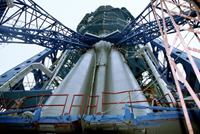Russia's top rocket manufacturer merges with four other space-related companies
A top Russian rocket manufacturer on Monday announced plans for a merger with four other space-related companies that is intended to strengthen its position in the global market for commercial launches.

Under the plan, the state-controlled Khrunichev State Research and Production Center will merge with the Voronezh Mechanical Plant, which makes rocket engines, and three other companies that manufacture rocket components and equipment, Khrunichev director Vladimir Nesterov told a news conference.
"The main goal is to pull together companies that are involved in our production program," Nesterov said. After the merger is completed later this year, Moscow-based Khrunichev will employ 35,000 people, he said.
Nesterov said the merger would bolster the company's efficiency by concentrating a greater part of manufacturing of Khrunichev's main product, the Proton booster rocket, under single management.
Thanks to its heavy-lift Proton, Khrunichev has been the top cash cow for the Russian space industry since the 1991 Soviet collapse, putting commercial satellites mostly foreign into high, geostationary orbits. Russia received tens of millions of dollars for each launch, an important source for an industry which struggled to survive on a fraction of generous Soviet-era state funding.
Nesterov sought to play down U.S.-based Lockheed Martin Corp.'s move last October to sell businesses involved in sales, marketing and mission management support for Khrunichev-built Proton and Angara rockets. He said that Khrunichev was strong enough to market its products on its own and said that the company was planning to announce two new contracts with foreign customers shortly.
Nesterov said that Khrunichev plans to launch six foreign commercial satellites this year using Protons. The company conducted four Proton commercial launches last year, one of which failed.
Khrunichev spokesman Alexander Bobrenev insisted that the loss of an Arab communications satellite in a botched launch last March had not hurt the company's standing. "The failure hasn't affected our launch plans," he told The Associated Press.
The bungled launch of Arabsat 4A was the latest in a series of mishaps that plagued Russia's space program, which also included the loss in October 2005 of the EUR120 million European Space Agency's CryoSat satellite intended to conduct mapping of polar ice caps and provide more reliable data for the study of global warming. CryoSat was launched by a Rokot booster rocket also built by Khrunichev.
That and other launch failures resulted in the ouster of the previous Khrunichev director in 2005.
Nesterov said that while commercial launches of foreign satellites had been Khrunichev's main cash earner in the past, the amount of state orders have increased sharply in recent years and now make up just over half of the company's portfolio.
Subscribe to Pravda.Ru Telegram channel, Facebook, RSS!


